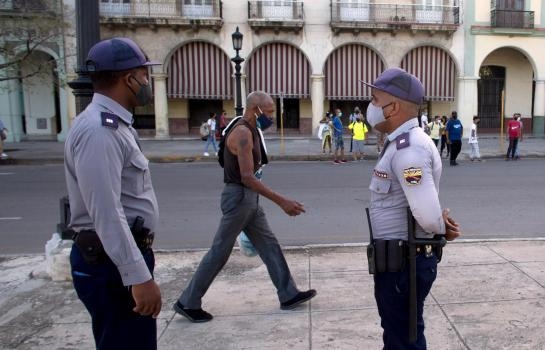Death confirmed in rare Cuban protests

Cuban authorities have confirmed that a man was killed during unrest in the country - the first confirmation of a death since the protests broke out.
State media say Diubis Laurencio Tejeda, 36, died in a suburb of the capital Havana on Monday.
According to officials, he was part of a group that attacked a government facility. But witnesses say security forces targeted members of the group.
The rare nationwide anti-government protests began on Sunday.
Thousands took to the streets to demonstrate over the collapse of the economy, food and medicine shortages, price hikes and the government's handling of the Covid-19 epidemic. Such unauthorized public gatherings are illegal in Cuba.
President Miguel Díaz-Canel has called demonstrators "counter-revolutionaries".
His government alleges that the protests have been financed and instigated by the United States, and blames Cuba's problems on US economic sanctions.
As yet there is no official explanation for how Diubis Laurencio Tejeda died. Cuba's interior ministry said in a statement that it "mourns the death" of the man.
State media said he was involved in "disturbances" in the La Guinera neighborhood of Havana on Monday, where a group allegedly attacked a government facility, state media reported. Several others were injured, including members of the security forces, it said.
But witnesses have said that it was the security forces that attacked people who had joined a spontaneous protest in the neighborhood.
Waldo Herrera, who lives in the area, told Reuters news agency that officers "took out their guns and started shooting" at the demonstrators.
"I think the Communists have lost control, they won't have a solution to this situation," he told Reuters.
The protests began at the weekend with a demonstration in the city of San Antonio de los Baños, south-west of Havana, but soon spread throughout the country.
Posts on social media showed people overturning police cars and looting state-owned shops that price their goods in foreign currencies. For many Cubans, these shops are the only way they can buy basic necessities but prices are high.
On Tuesday the police were out in force on the streets. More than 100 people have been arrested and many relatives are looking for information on their whereabouts.
A woman asking about her 21-year-old son at a Havana police station told AFP news agency that he had been taken from his home, "handcuffed and beaten". She added: "They took many from the neighborhood, young and old."
A young man, who only gave his name as Carlos Alberto and was contacted by phone by BBC Mundo, said he was hiding at his girlfriend's home after taking part in a demonstration.
"I'm afraid the same thing could happen to me," he said. "We we're just asking for freedom and with this attitude they're showing what they are: a dictatorship."
There were also reports of internet blackouts across the island. Cuba rolled out access to mobile internet in December 2018 but is controlled by the state.
Internet shutdown watchdog NetBlocks said on Monday that state-run internet provider Etecsa had blocked access to platforms including WhatsApp and Facebook.
Among the demonstrators, artists and reporters detained is Cuban journalist Camila Acosta, who writes for Spanish newspaper ABC.
Spanish Foreign Minister José Manuel Albares called for her immediate release in a tweet on Tuesday, and asked Cuba to respect people's right to demonstrate "freely and peacefully".
